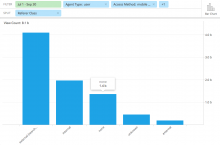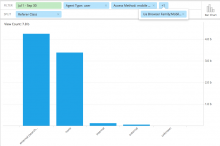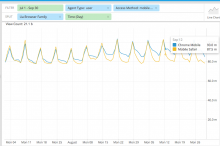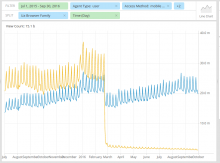Below you see the ratio of internally referred pages to all other pages. Roughly speaking the ratio of internal to all other pages is directly proportional to session length. 1:5, means there were 5 entries to wikipedia and only one of those people/sessions had a search or clicked on a link. 5:1 on the other hand would mean that 1 visit had 5 clicks or searches.
Using pivot.wmflabs.org, which is a GUI analysis tool for our weblogs, I see below is that the "session length" is much lower on mobile safari than on mobile chrome.
Mobile Chrome:
Mobile Safari:
When you look at weekend v. week and compare pageviews on mobile chrome and mobile safari we see that safari seems to have much lower pageviews during the week than chrome, but roughly equal on the weekends. This might correspond to the increased use of wikipedia for work/school on the weekdays, which leads to longer sessions. It also looks like this difference is fairly new.
This suggests that either:
- safari sessions are dramatically shorter, OR
- there is an error in how we identify referrals on Safari, OR
- there is a bug in pivot.wikimedia.org




